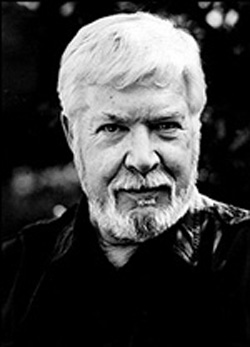Related Research Articles

Timothy Irving Frederick Findley was a Canadian novelist and playwright. He was also informally known by the nickname Tiff or Tiffy, an acronym of his initials.
The Genie Awards were given out annually by the Academy of Canadian Cinema and Television to recognize the best of Canadian cinema from 1980–2012. They succeeded the Canadian Film Awards (1949–1978) known as the "Etrog Awards" for sculptor Sorel Etrog, who designed its statuette.
Roman Kroitor was a Canadian filmmaker who was known as a pioneer of Cinéma vérité, as the co-founder of IMAX, and as the creator of the Sandde hand-drawn stereoscopic 3D animation system. He was also the original inspiration for The Force. His prodigious output garnered numerous awards, including two BAFTA Awards, three Cannes Film Festival awards, and two Oscar nominations.
William Frederick (Bill) Whitehead was a Canadian writer, actor and filmmaker. Whitehead is best known as a writer of radio and television documentaries and as the former partner of the late Canadian writer Timothy Findley.
The 1st Genie Awards were presented on March 20, 1980, and honoured films released in 1979.
The Academy of Canadian Cinema and Television presents an annual award for Best Motion Picture to the best Canadian film of the year.
The Academy of Canadian Cinema & Television presents one or more annual awards for the Best Screenplay for a Canadian film. Originally presented in 1968 as part of the Canadian Film Awards, from 1980 until 2012 the award continued as part of the Genie Awards ceremony. As of 2013, it is presented as part of the Canadian Screen Awards.
The Canadian Screen Award for Best Achievement in Editing is awarded by the Academy of Canadian Cinema and Television to the best Canadian film editor in a feature film. The award was presented for the first time in 1966 as part of the Canadian Film Awards, and was transitioned to the new Genie Awards in 1980. Since 2012 it has been presented as part of the Canadian Screen Awards.
Cities is a Canadian documentary television series broadcast on CBC Television from 1979 to 1980. Produced and directed by John McGreevy, the series featured a celebrity who would appear in an episode profiling a personal favourite city or more specific location.
Rick Herbert Richard Wilkins is a Canadian composer, conductor, and tenor saxophonist. He is primarily known for his work as an arranger. He has worked extensively for CBC and CTV arranging, rehearsing, and often conducting music for television and radio programs of pop-music and variety entertainments. He has arranged music for television specials featuring Julie Amato, Tommy Ambrose, Guido Basso, the Canadian Brass, Burton Cummings, Anne Murray, and Wayne and Shuster among others. In 1976-1977 he worked as a music director for CBS in Los Angeles, where among his projects was directing music for a number of specials starring the Jackson Five.
Documentary '60 is a Canadian documentary television series which aired on CBC Television from 1959 to 1960.
Terence Macartney-Filgate was a British-Canadian film director who directed, wrote, produced or shot more than 100 films in a career spanning more than 50 years.
Don Haig was a Canadian filmmaker, editor, and producer.
The Academy of Canadian Cinema and Television presents an annual award for Best Feature Length Documentary. First presented in 1968 as part of the Canadian Film Awards, it became part of the Genie Awards in 1980 and the contemporary Canadian Screen Awards in 2013.
Stanley Jackson (1914–1981) was a Canadian film director, producer, writer and narrator with the National Film Board of Canada (NFB).
The Academy of Canadian Cinema and Television's Award for Best Short Documentary is an annual Canadian film award, presented to a film judged to be the year's best short documentary film. Prior to 2012 the award was presented as part of the Genie Awards program; since 2012 it has been presented as part of the expanded Canadian Screen Awards.
Grahame Woods was a Canadian cinematographer and writer. He is most noted as a cinematographer for his work on the television drama series Wojeck, for which he won the Canadian Film Award for Best Black-and-White Cinematography at the 19th Canadian Film Awards in 1967 for the episode "The Last Man in the World"; as a writer, he is most noted for the television films War Brides (1980) and Glory Enough for All (1988).
Timothy Findley: Anatomy of a Writer is a Canadian television documentary film, directed by Terence Macartney-Filgate and released in 1992. The film is a portrait of writer Timothy Findley, featuring both interview segments and scenes which try to illuminate his creative process by dramatizing several rewritten variations on his then-forthcoming theatrical play The Stillborn Lover as acted by William Hutt, Martha Henry and Susan Coyne.
Fields of Endless Day is a 1978 Canadian docudrama film, directed by Terence Macartney-Filgate. The film dramatizes various vignettes from Black Canadian history, from the early settlement of New France in the 1600s through to the early 1930s.
Arla Agnes Isabella Axelsdotter Saarukka, commonly known as Arla Saare, was a Canadian film and television editor. She was noted for being a two-time Canadian Film Award winner for her work in both sound and picture editing.
References
- 1 2 "37 years later, CBC stirs on Dieppe raid". The Globe and Mail , November 10, 1979.
- ↑ "Terence Macartney-Filgate". The Canadian Encyclopedia , November 14, 2010.
- ↑ "NFB, Brittain dominate TV Genie awards". The Globe and Mail , March 20, 1980.